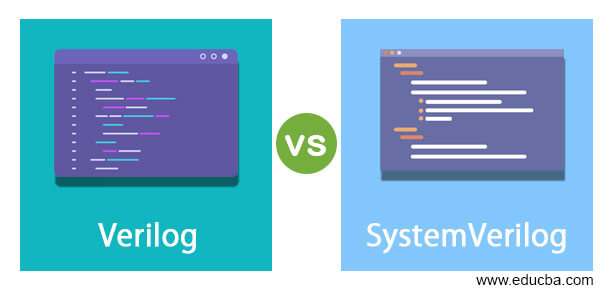Updated April 6, 2023
Difference Between Verilog vs SystemVerilog
The following article provides an outline for Verilog vs SystemVerilog. Verilog is a language for hardware classification. It also facilitates the verification of analogue circuits and mixed signals and the construction of genetic circuits. Verilog was joined to the SystemVerilog standard in 2009. Verilog is, therefore, part of SystemVerilog at this time. SystemVerilog is a Verilog hardware description with additional functionality and a Verilog hardware verification language. It facilitates the modelling, design, simulation, testing and deployment of electronic systems. In the semiconductor and electronic design industry, SystemVerilog is still mainly used. Wire and Reg are the most important data forms for Verilog. In a circuit linking gates or components, wire denotes physical wire. From one assignment to the next, Reg retains value.
Verilog is a language for hardware description (HDL). It is a programming language that explains the electronic circuit structure and behaviour. In 1983, Verilog started out as a proprietary hardware modelling language at Gateway Design Automation Inc. and in 1995 became IEEE standard 1364. Verilog is based on a testbench module standard. Verilog supports various abstract levels. The degree of comportment represents the algorithms of the concurrent. The Transition Level Registration (TLR) describes operating circuit properties and data transfers between the registers. In addition, Gate Level determines the logical connections and time characteristics.
SystemVerilog is a mix of both the HDL and the Hardware Verification Language (HVL) combined as an HDVL. This ensures that the configuration and conduct of electronic circuits are discussed and the electronic circuits in a Hardware Description Language checked. In 2005, SystemVerilog acted as a Verilog super-set, with various extensions to the Verilog vocabulary, and it became IEEE 1800 standard. SystemVerilog is based on a more complex class testbench. The static and automated two types of data defined in SystemVerilog. At the outset of the programme execution, the programmer generates static variables. This is the same for the whole lifetime of the software. This value can also be changed if a new value is allocated during execution. In addition, the programme execution is in the variable; at this time, automated variables are generated.
Head to Head Comparison Between Verilog vs SystemVerilog (Infographics)
Below are the top 10 differences between Verilog vs SystemVerilog:
Key Difference
Let us discuss some of the major key differences between Verilog vs SystemVerilog:
- Hardware Description Language or HDL is used to model electronic systems in Verilog, whereas, in SystemVerilog, HDL helps to model, design, simulate, test, and implement electronic systems.
- SystemVerilog, by comparison, is a hardware description and a hardware control language used for planning, simulating, testing and implementing electronic devices. That is why Verilog and SystemVerilog are mainly distinct.
- Verilog is mostly inspired by C and Fortran, and C++ and VHDL influence SystemVerilog.
- Verilog supports Reg and Wire data types, whereas System Verilog supports many data types like class, struct, enum, union, string, etc.
- Another significant distinction is that Verilog supports a structured paradigm, but SystemVeriliog supports formal and object-oriented paradigms. Furthermore, Verilog uses a testbench module-level while SystemVerilog uses a testbench based on class.
- Verilog supports data type Wire and Reg, while SystemVerilog supports different data types, including enum, creation, class, synchronisation and string.
- Memories in Verilog are static, e.g. reg[7.0] X[0:127]; 128 bytes of memory. In SystemVerilog, Memories are dynamic and allocated at runtime. E.g. Logic[3:0] Length[$].
- Verilog has a single always block for the implementation of combinational and sequential logic. the system contains always_comb, always_ff and always_latch procedural blocks.
- Verilog supports a structured paradigm, whereas it supports structured as well as to object-oriented paradigms and artefacts.
- In comparison, the.v or.vh expansion is used in Verilog while the.sv and.svh extensions are included in SystemVerilog.
Verilog vs SystemVerilog Comparison Table
Let’s discuss the top comparison between Verilog vs SystemVerilog:
| Sr. No | Verilog | SystemVerilog |
| 1 | Initially, it was supposed to be expanded to Verilog in 2005. | It started as a proprietary hardware simulation language in 1983. |
| 2 | Hardware Description Language or HDL is used to model electronic systems in Verilog. | In SystemVerilog, HDL helps to model, design, simulate, test and implement electronic systems. |
| 3 | It is standardized as IEEE 1364. | It is standardized as IEEE 1800. |
| 4 | The C language and Fortran programming language are supporting languages of Verilog. | SystemVerilog’s programming language is Verilog, VHDL and C++. |
| 5 | In structuring and modelling electronic structures, Verilog terminology is used. | SystemVerilog is used for electronic function models, prototypes, simulations, experiments and implements. |
| 6 | Verilog is a language for hardware description. | SystemVerilog is a blend of both hardware and hardware verification language (HDL) (HVL). |
| 7 | Verilog supports a structured paradigm. | It supports structured as well as to object-oriented paradigms and artefacts. |
| 8 | Verilog is based on the testbench module standard. | SystemVerilog is based on the testbench stage of the class. |
| 9 | Verilog supports Reg and Wire data types. | SystemVerilog supports many data types like class, struct, enum, union, string, etc. |
| 10 | It has a single always block for the implementation of combinational and sequential logic. | It has always_comb, always_ff and always_latch procedural blocks. |
Recommended Articles
This is a guide to Verilog vs SystemVerilog. Here we discuss the Verilog vs SystemVerilog key differences with infographics and comparison table. You may also have a look at the following articles to learn more –




